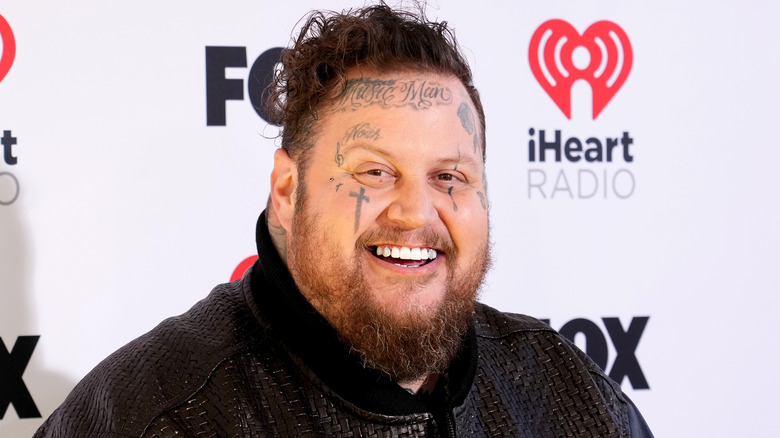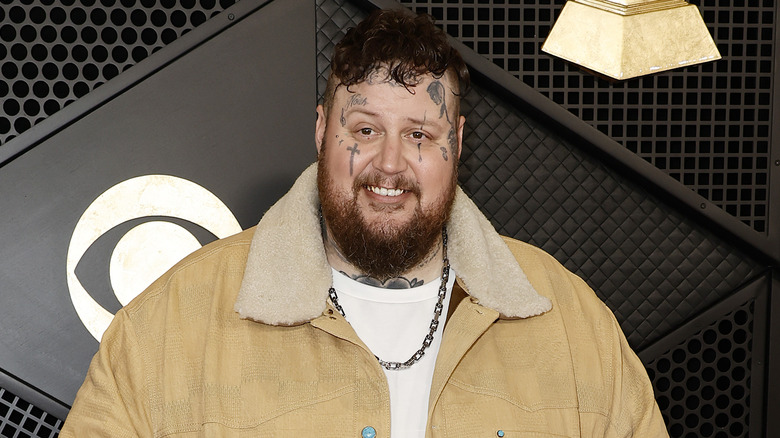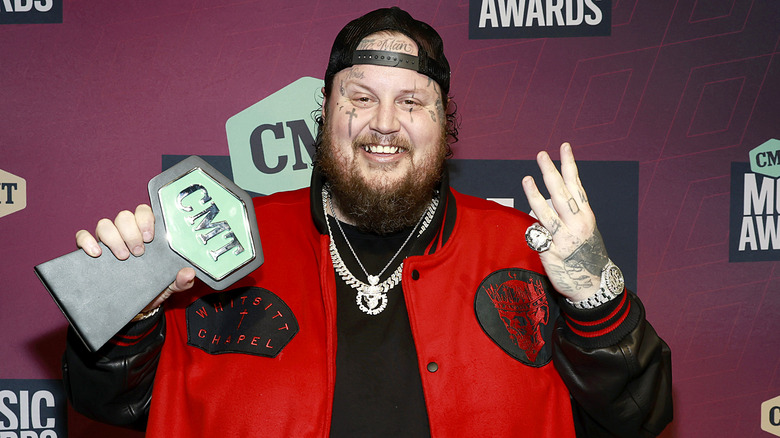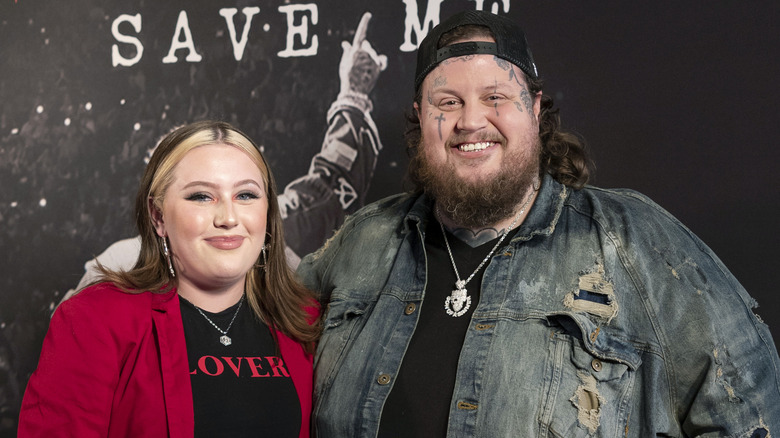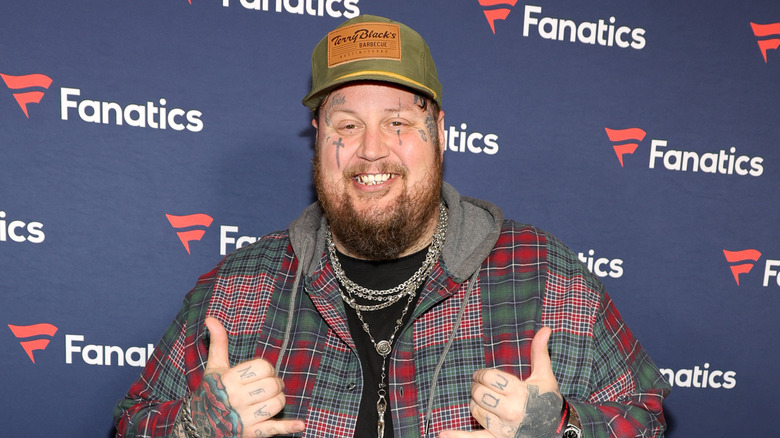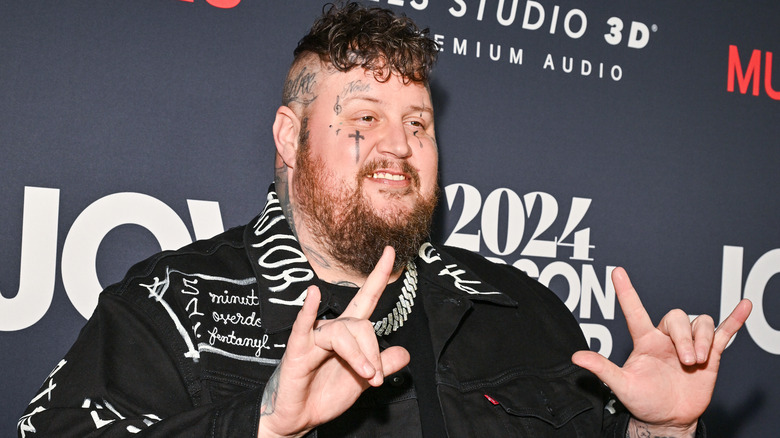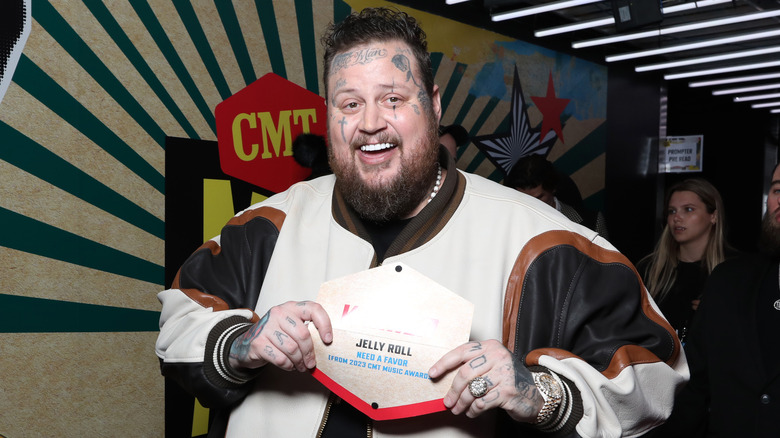Tragic Details About Jelly Roll
The following article includes mention of addiction and mental health.
In a relatively short amount of time, Jelly Roll has gone from niche artist to mainstream superstar, and it's not hard to see why. His musical style is unique — firmly rooted in country but informed by his background in hip-hop and love of the blues — and the depth of his lyrics make him stand out in a world where shallow lyrics are often the norm.
In his songs, like "Son of a Sinner" and "Save Me," Jelly displays a level of vulnerability that has drawn millions of people to his music. He exhibits that same raw honesty in interviews and on social media, where he speaks candidly about his difficult childhood, the poor choices he made in his past, and the addiction, mental health, and obesity issues he continues to navigate.
Born Jason DeFord — the singer was given his nickname as an overweight kid – Jelly was raised in a community where addiction was rampant, and opportunity was scarce. Through his music, Jelly has risen from the ashes and gone on to reach amazing heights, such as playing the historic Grand Ole Opry, gaining popularity on the country music charts, and receiving two Grammy nominations. Though he has been a symbol of resilience and self-betterment, Jelly's life has had many struggles.
His early years did not set him up for success
It's a sad fact that some people's early lives set them up for success, while others deal with barriers that make it more difficult to lead a stable life. Jelly Roll didn't grow up with the privileges many Americans take for granted, and because of his upbringing, felt he had few options as a youngster. The singer was raised in Antioch, a rural part of Tennessee outside of the Nashville area where opportunities were limited.
"I just remember everybody doing drugs. I was in my 20s before I realized that having a drug addict in your family wasn't normal," Jelly explained to GQ, alluding to his mother's struggle with addiction. "It was scratching and clawing by, and sadly, scratching and clawing by was better than everybody else. I don't remember nobody with real money."
Jelly's father worked — selling meat and running a bookie business on the side — but the income wasn't enough to provide the singer and his three older half-siblings with their needs. In a 2023 interview on the "Flagrant" podcast, the singer admitted that he didn't realize how poor he was until later, even referring to his childhood home as a "shack." Seeing those around him scrambling to make ends meet, and bending the law to do so, made Jelly feel like his only means of survival was criminality. "I knew my father booked bets. I knew my mother struggled with drugs. So, to me, this was just what you did," he told CBS News.
Jelly Roll became his family's provider after his parents' divorce
Jelly Roll's dad was married five or six times – even the singer is unsure of the number of times — so his parents divorcing when he was 13 probably came as a shock to no one. Jelly remained with his mom, and he was quickly forced to take on the role of provider. "I felt this need to take care of my mother back then," he said in a Billboard interview. "When he left, I was like, 'Somebody's got to do what he was doing, at least trying to figure out some money.'"
This financial need is what first led Jelly into a life of crime, which began with dealing drugs. Drugs were an ever-present factor in the singer's life, as he witnessed his mother's drug usage and mental health conditions as a young child. This is also what led Jelly to find music as an outlet.
"What got me into music was my mother. So, my mother was a woman who struggled with extreme mental health issues and drug addiction, and she would never come out of her room," he recalled on "The Joe Rogan Experience." When she did emerge, Jelly's mom would turn up the music and draw in a crowd. "Something changed in her when the record went on ... so I spent my whole life writing songs for her."
He quit high school and landed in jail by 14
It wasn't long after his parents' divorce that Jelly Roll landed himself in handcuffs, which was the start of roughly a decade in the judicial system. His first arrest came when he was only 14, and he was in and out of juvenile detention for the next handful of years. During this period, Jelly only spent a total of 60 or 70 days in high school and spent those years thinking he was "a real dumba**" and "learning disabled," according to his interview with Billboard.
"I was in and out of there for about three, three and a half years. I spent a lot of time there and eventually got charged as an adult for a crime I committed as a juvenile," he told People. "And I just realized that was the most impactful thing that ever happened in my life, and the darkest moments of my life still were being that 15-year-old scared kid spending Thanksgiving away from his family."
Due to his own experiences, Jelly has been committed to making life better for those who are incarcerated. In 2022, he even donated a recording studio to the Davidson County Juvenile Detention Center, the same detention center he was in as a teen. Though he started making music at 9 or 10, it was in juvenile detention that Jelly honed his writing skills and developed a deep passion for rapping.
He can't vote due to a crime he committed at 16
Jelly Roll's first arrest did little to curb his lawless activity, and he went on to be arrested about 40 more times over the next decade. His list of crimes included drug possession, drug dealing, and violations of his probation. He was also convicted on charges of aggravated robbery, for which he was tried as an adult despite being 16 at the time of the crime. "I never want to overlook the fact that it was a heinous crime," he told Billboard. "This is a grown man looking back at a 16-year-old kid that made the worst decision that he could have made in life and people could have got hurt and, by the grace of God, thankfully, nobody did."
Still, Jelly has questioned the way he was handled in court and the aftermath that has left him without many basic rights. He was sentenced to 18 months for the offense, but prosecutors were threatening up to 20 years behind bars at one point. "I hadn't hit my last growth spurt. I was charged as an adult years before I could buy a beer, lease an apartment, get a pack of cigarettes," he added. "I feel like the justice system at that point kind of parked me on my only set path."
Because of this felony conviction, Jelly's right to vote was taken from him before he even reached voting age. He also cannot possess a firearm, volunteer at most nonprofit organizations, or enter some countries.
Jelly Roll missed his first child's birth behind bars
Jelly Roll was 23 years old and serving time for dealing crack cocaine when a previous girlfriend gave birth to his daughter, Bailee Ann, in 2008. Becoming a parent was a turning point for Jelly, and after Bailee was born, Jelly transferred to the education unit in his jail and earned his GED after dropping out of high school. The singer met 2-year-old Bailee upon his release and has not returned to jail since.
"Being a father is so important to me. The single most impactful event of my entire life was having my daughter. It changed everything," he gushed to People in 2023. Due to Bailee's mother's sobriety journey over the years, his first child has lived with him full-time since 2016.
Eight years after having his daughter, Jelly welcomed his son, Noah Buddy, in August 2016 with a former girlfriend. That same month, the singer married podcast host Bunnie Xo, whom he met at one of his shows in Las Vegas. A lot less is known about Noah, whom Jelly shares custody with his mother, as they generally work around him appearing in photos and videos to respect his mother's wishes. "I never want to step on her toes, with what she's doing with him, that I want to just respect that boundary," he explained to Taste of Country.
He has overcome his addictions to cocaine, pills, and codeine
Jelly Roll began experimenting with weed at an early age, and marijuana possession was the reason for his first incarceration at 13 years old. By the age of 15, the singer had tried a laundry list of drugs, including cocaine, prescription pills, acid, and meth. This early usage — coupled with his mother's addiction and the substance abuse issues that ran rampant in his community — led Jelly to develop his own dependency on drugs.
Many of his songs, including his 2020 hit "Save Me," detail this darkness in Jelly's past. "I see myself as a broken man that's trying to put the pieces of the puzzle back together," he said of his 2023 album, "Whitsitt Chapel," in an interview with The Guardian. "I looked at the whole experience as a cry for help. And it was heard. The music represents so many people that haven't felt heard."
Though he references "smokin' and drinkin'" in "Save Me," Jelly has named cocaine, pain medication, and codeine as his main problem areas. He told Billboard that these drugs had control over his life and he no longer indulges in them, besides still drinking and smoking weed. "I had to learn that you could drink alcohol without doing cocaine. It took me a long time to learn that," Jelly expressed to People. "There was a long time where I just assumed, when people told me they drank without doing cocaine, I was like, I thought we only drank to do cocaine."
He also reevaluated his alcohol use
Though he has identified as a drug addict and not an alcoholic, Jelly Roll has admitted that alcohol is something he has to be careful not to abuse. The same goes for marijuana, which he not only uses but also sells by way of his company, Bad Apple Cannabis.
Jelly — who's careful to make the distinction that he's not completely sober, believing that doing so would be disrespectful to those who are fully substance-free — worked hard to stop all other drug use, which he managed without attending rehab. "I had to get rid of the lean [codeine-laced drink], the pills, the cocaine. I didn't have a choice," he told The Guardian. "It was me or them, and I had to learn to love myself."
While Jelly enjoys recreational drinking and smoking, he does so mindfully and purposefully, checking in with his emotions and reaching out for help when needed. "Because I do drink and smoke weed, I will attend meetings occasionally. If I'm really struggling with thinking of my behavioral pattern, I'll go to a meeting," he opened up to People. "I just — out of an abundance of respect for the people who really got off the drugs completely, and the alcohol and the weed — don't necessarily claim to be a part of the program, because I respect their work and I would never want to diminish it with some of my actions, but AA has done a lot for me."
His bipolar disorder was untreated for a long time
Jelly Roll has been incredibly forthright about his mental health issues, and especially his experience with bipolar disorder. "When I was younger I was diagnosed with manic depression. I have moments of extreme productivity where I feel like nothing can stop me," the singer discussed in a 2021 Instagram post. "I'm full of energy and confidence, then I have weeks on end where I won't answer my phone or respond to a text message."
His music, including his 2020 song, "Nothing Left At All," has described his bouts of depression, with many fans being able to connect to the relatability of his condition. "Though I smile, joke and laugh a lot deep rooted in my is an unexplainable pain," he continued in the post. "I think the reason I decided to finally post this is because I feel the need to be honest, and also it's my public vow to start being more transparent and hope that maybe you all will help me stay accountable at seeking help and fighting this demon."
Similar to how his mother self-medicated with drugs when he was a child, Jelly early in life began to rely on outside substances to quiet his anxiety and handle his depression. Because of the way he was raised, it took the singer a long time to learn how to cope with his issues in a healthier way, such as through writing songs and undergoing treatment.
His mental health issues led to weight struggles
As a child, Jelly Roll was told to ignore his mental health issues, which is something he sees as a contributing factor in his turn to illegal activity. Jelly has spoken about being fearful of his own mind, putting into words the struggle that many others face in their own lives. "As jovial as I am in real life, the music is a reflection of a very, very dark hallway between my ears," he told The New York Times. "It's the scariest place on earth for me."
After making some real money, Jelly started an immersive therapy program that included an exercise where he linked together the timeline of his life. It was in therapy that he was first able to see the connection between his mental health and his weight, which has been a challenge for him since before kindergarten – around the time his mother gave him the "Jelly" nickname.
"I found [trauma] to be like one of the roots of probably my obesity, right? This isn't a lack of discipline," he explained to Billboard. "I run a multimillion-dollar business. I work 12, 15, 18 hours a day. I'm a disciplined man. It's got to be something else." Jelly confessed to People in December 2023 that he was still addicted to "the pantry," but it remains something he works on. In January 2024, he revealed on his Instagram that he was training to run a 5K in May 2024.
He has been surrounded by loss
Jelly Roll's ability to be candid with his emotions, good and bad, is what makes him so relatable. It shines through in his music, but also his interactions with others. The singer has said he did not cry at all in his youth, which is almost shocking given the ease with which he can drop a tear. Jelly cries in interviews, on stage, and viewers even saw some waterworks while he was coaching "American Idol" in 2024.
"Dude, I didn't cry until I was 34 years old. I can't quit crying now. I'm an empath for people, period," he told The New York Times. Of all the times he has expressed his emotions publicly, Jelly's poignant discussions of grief hit the hardest. Having grown up in a place where dying young was not uncommon, Jelly has much experience around with death. He has spoken about burying many friends, and publicly mourned the murder of a young man he referred to as a "nephew."
But nothing has impacted Jelly as much as the death of his father, Buddy DeFord, in 2019, which he called the most difficult thing he has ever experienced in the aforementioned "American Idol" appearance. "Today my best friend of 34 years took his last breath," the singer wrote in tribute to his father Buddy DeFord on his Facebook page. "He taught me all men were created equal in the eyes of God. He taught me how to carry myself as a man."
His survivor's guilt is complicated
Though over 30 of his friends have died due to drug addiction, many people Jelly Roll grew up with are still living a life full of struggle. This has proven to be a conflict for Jelly, who feels a certain level of guilt for having gotten out of the lifestyle into which he was born.
"I have a phone full of the sob stories; guys I knew from the past. And they want two grand, five grand, a car, a house," he told The Guardian in 2023. "So you read them. And it just hurts. The guilt you feel creates a spiral of shame. But it also hurts to separate yourself from these people." Jelly eventually had to change his phone number, cutting off communication with many former friends still living "a certain life." "I might not talk to you, but I'm still bonding you out," he explained to Billboard.
Due to these experiences, Jelly has done a lot of good in the world, especially by advocating for at-risk people and communities. For instance, he put $250,000 toward improving life for incarcerated and underserved Nashville youth in 2022. He also released the song "She," in partnership with Shatterproof, a non-profit devoted to addiction awareness and crisis support. His 2023 tour raised $590,000 for at-risk youth, and Jelly has even spoken to Congress about the fentanyl crisis.
If you or anyone you know needs help with addiction or mental health issues, contact the relevant resources below:
- Visit the Substance Abuse and Mental Health Services Administration website or contact SAMHSA's National Helpline at 1-800-662-HELP (4357).
- Contact the Crisis Text Line by texting HOME to 741741, call the National Alliance on Mental Illness helpline at 1-800-950-NAMI (6264), or visit the National Institute of Mental Health website.

